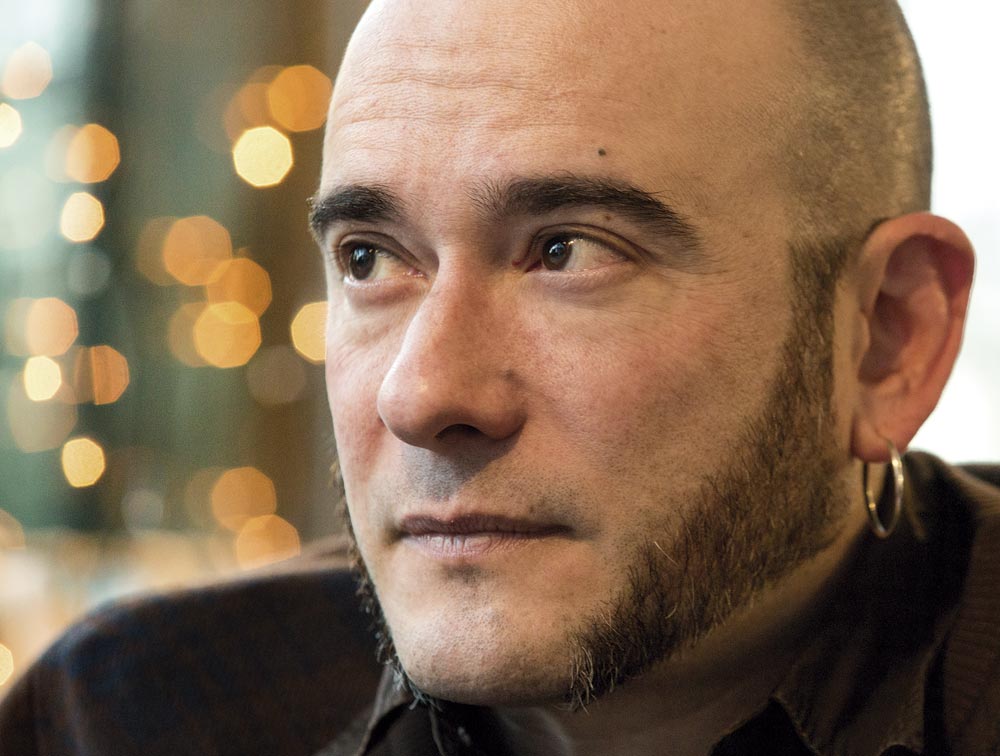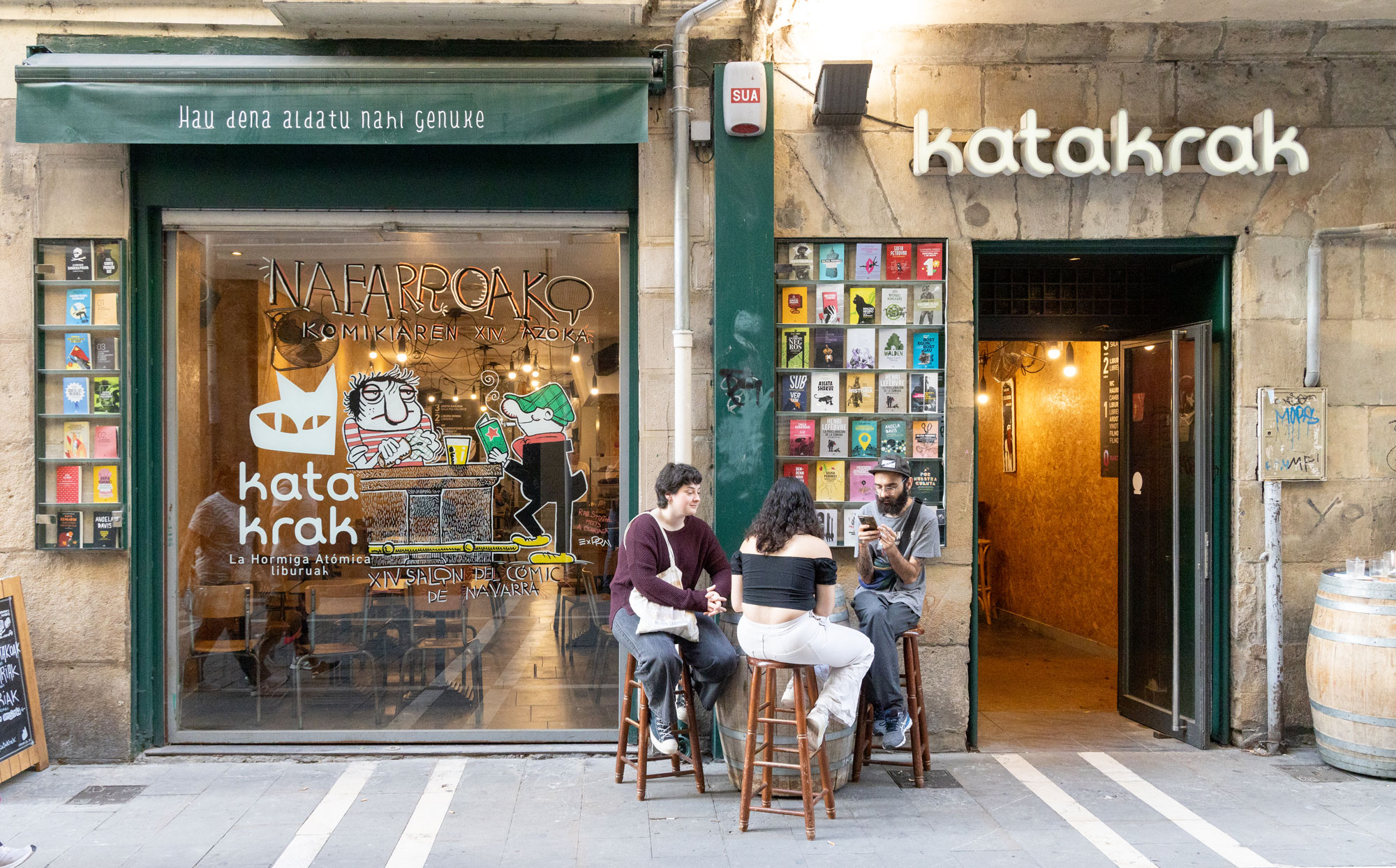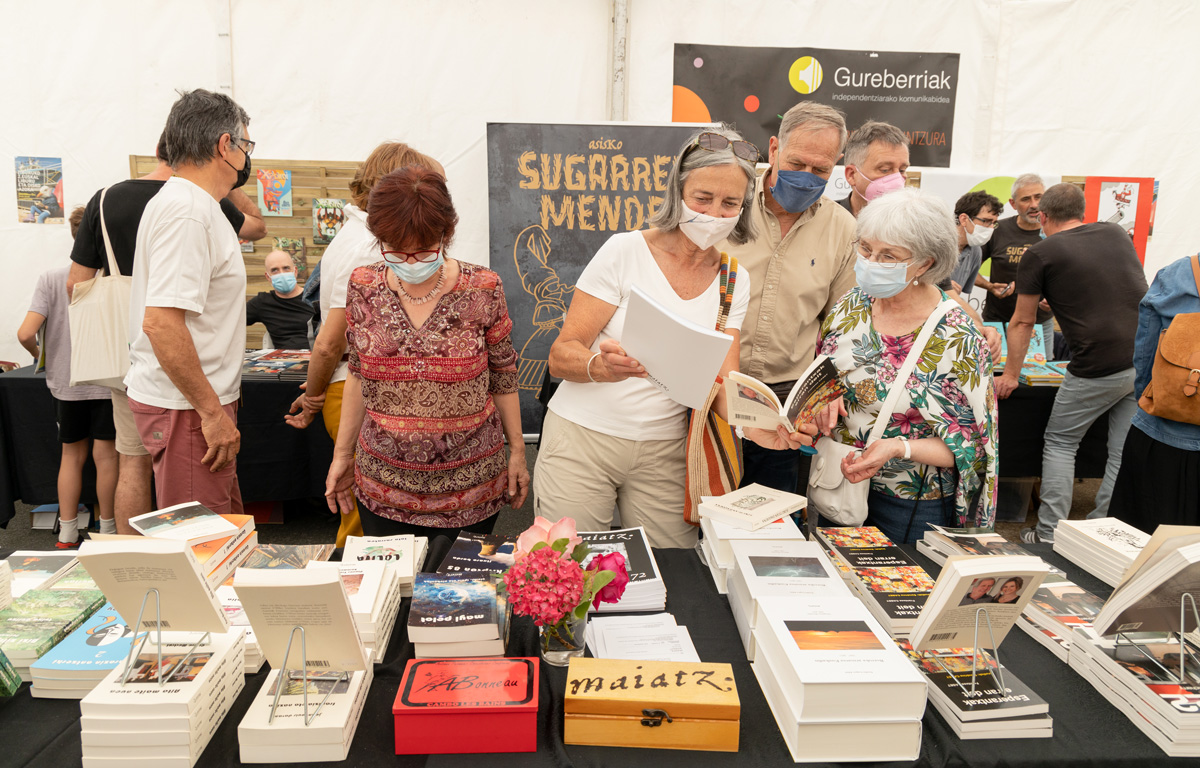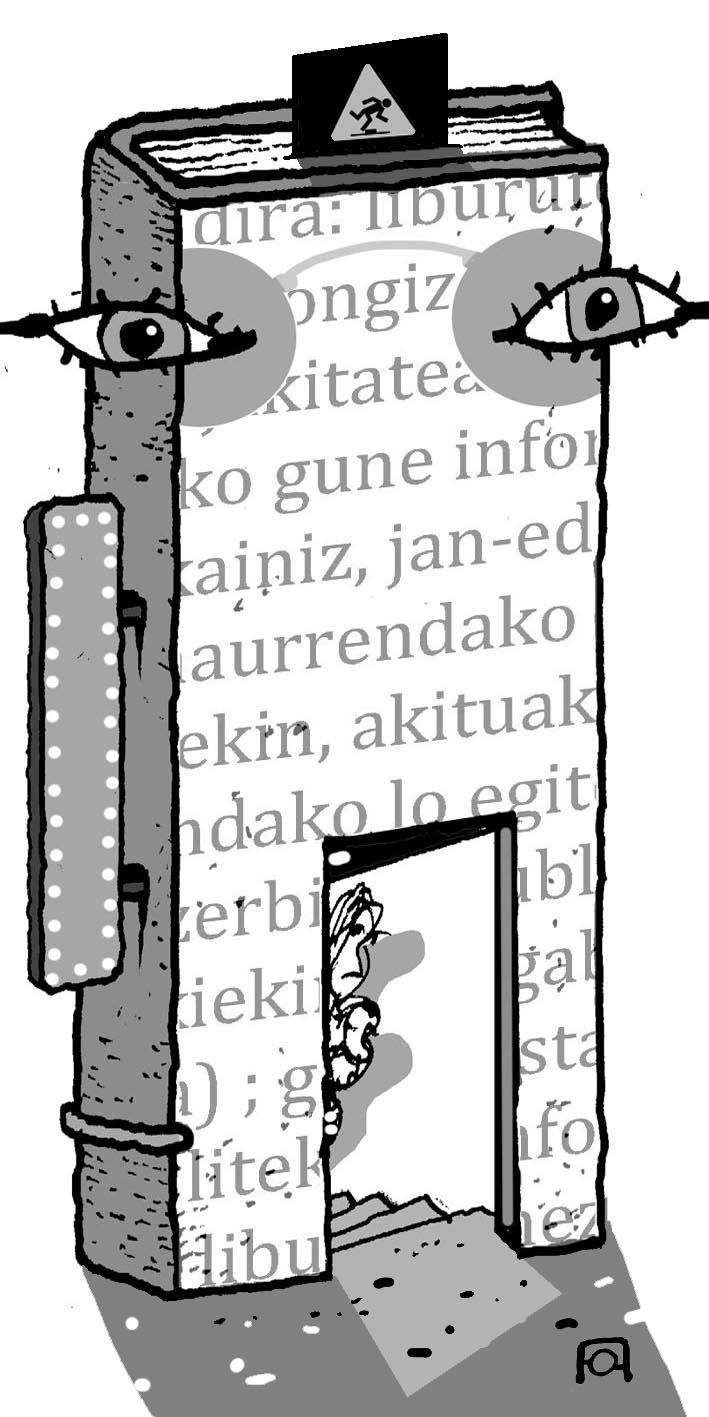"I would say we're low in every way."
- After more than a decade, José Antonio Quiroga, associate editor of Bolivia, told Mikel Soto: “Ufa, the damage is already done. There are no former Jesuits, no former Trotskyists, no former editors. From now on, when you enter the bookstores, when you take a book, you’ll always be thinking about what to improve, what to do…”. And Soto is right. He has learned a trade at the Txalaparta and, even if he gives it, he carries it with him.

Historian lizentziatua. Kontatu digunaren arabera, ikasketak hautatzeko garaian, dudatan ibili zen, sukaldaritza ala historia ikasi, eta bigarrenaren alde egin zuen. Orain, ordea, editore jarduna utzi duen honetan, sukaldaritzari buruz idazten hasi da Zazpika aldizkarian, ilusio handiz. Besterik ere idatzi du: Unamunori buruzko biografia bat (Elkar, 2006), Iñaki anaiarekin batera, eta kazetariak berak azpimarratu nahi lukeen artikulu bat: Violencia sexual y tortura (txalaparta.eus, 2018ko otsaila); torturaren genero-osagaiari buruz.
For thirteen years you have worked as an editor at Txalaparta. You left it last summer. How's the landing going?
Hard. On the one hand, it has meant a tremendous change in pace, and it has cost me to balance. Then it's a phase shutdown, which could be a grief, and that's also hard.
Why did you leave it?
I don't like to mistify the work of editors or writers, but the editor works with a pretty sensitive material and needs a certain degree of trust. Mikel Buldain, current director or manager of the Txalaparta, proposed several changes, and I didn't see myself there, those changes affected my conditions and my comfort within the Txalaparta. I recognized myself and saw that, in such a situation, I would not be able to convey confidence and comfort to the writers. And I thought maybe the time had come to close the Txalaparta cycle.
Can I ask you what changes were these?
I don't think it's worth it.
OK. And what is that sensitive material that you say, whether it's a writer or it's a work?
Both.
In what sense are they sensitive?
Without going into mystification, writers do something very personal. There's a theory that says that no matter what you write, you always write about the writer. For example, if you read Stephen Kingen Misery, it can be a Gothic horror novel, or it can be an addiction of the writer to alcohol. If literature is good, it is a truth that is closely linked to the writer. The editor is often the first person to read that material and has to work with it.
Taking this into account, what characteristics should an editor have?
I think it has to dominate human relations. There is a very nice word in Basque: gentleness. Well, I think the editor should be polite. You have to understand that not all writers are equal, that not all works are equal. For example, for me, Raymond Chandler's best book will surely be The Long Goodbye [No Bye; translated by Xabier Olarra and published by Igela]. Well, his editor always didn't like anything, because he found it different from Chandler's other books, the feeling. Chandler got offended and changed the publisher. It was a novel he had written while his wife died... And the book is called Ez adiorik… Everything that was obvious, I find it amazing how the editor didn’t see it.
What is the work of an editor?
In the size of the Basque Country, there is no almost pure editor that exists in other areas, dedicated exclusively to reading, directing… In our case, it is an editor the psychologist, public relations, the press, the accountant, the corrector… It has to do a little of everything. Looking at the text, I always say that he is an editor, especially a very godly reader, who takes a book and sees what interest he can have, and then what he is reading in parts and what he is trying to ask: Why is this so? Could there be any difference?
Did you have a thorn left?
Yes. In what sense?
Something you would like to publish and not get everything…
The books that haven't done to me? It will be over 30. Some, in addition, for very simple reasons: for lack of time, for example.
In the txalaparta, what has been your contribution or the line you wanted to work especially?
It is difficult to answer, because we always have to understand that I have worked within an organization and within a group, but it is true that in part, in the Txalaparta, there was generational change. In this sense, if I have contributed something, always together with my co-workers, other editors and the editorial team, it seems to me that the Txalaparta has been modernized, not only in concrete issues, but also in the treatment of issues. Perhaps it is very clear on the issue of feminism. The txalaparta has a certain popular vocation, it tries to give this people the tools to understand the processes and, at another time, about the queer theories that I read, and I saw that Euskal Herria was very lost in that, and I thought something had to be done. We started publishing a few things, and I'm happy with what the Txalaparta did. Today there are several feminist collections, translations are being made, and I believe that the Basque edition has also done the same, which has been modernised. And it's very gratifying to see that and to have been involved in it.

You started working at Txalaparta at a very special time: after being in jail. How do you remember that time?
I always give the same recommendation to people leaving jail. I was very short, only two years, but something happened to me that has happened to a lot of people later. You say a few months after you leave prison: I am fine. But you're not fine. Then, after a year and a peak, I thought: now I'm fine, before not. Before I started in the txalaparta, I was at the Herriko Taberna in Pamplona, in the bar and in the kitchen, and that was important, contact with the people… there I made a little upward.
Politically, it was a time of illegalization, a very hard time that we have been through in relation to the conflict. The last part has been terribly terrible for all sides, and the last two decades have been really tough. I think that also influences culture.
He was arrested in 2002. What was your case?
Several persons, all ETA militants, were arrested. After them, they arrested us, me and my then girlfriend, Ainara Gorostiaga. When we were in police station, we got a tremendous beating. I didn't finish the five days, the third day the coroner took me out because I was done a whore and from there they sent me to the hospital. I was in the hospital more than a week, in total I was incommunicado about eleven days. We were arrested on charges of collaborating with an armed band, but when they took me to testify, it was no longer a collaboration, it was not a membership, it was a murder: Murder of the councillor of Leitza José Javier Múgica Astibia. Until then, I had not heard of it, either in the interrogation, or anywhere. But Ainara did terrible things, and she said we did it.
We were therefore in jail for belonging to ETA and for murdering a councillor. Normally, you can't spend more than two years without trial, but the Basques either pass by, or it happened to us, after two years signing, and you did two more, in total you can take four years without trial. But we, after those two years, were left in the street. It was very strange. When we were called to testify, they told us that they knew for a long time that we had not been us, that documentation had appeared in a house in France and it was shown that we had not killed it. When he was left on Ainara Street, there was a huge uproar, because the question was very clear: if they have not murdered that councilman, what have they done to confess him? Ibarretxe asked that question, many others too, and the truth is that there was a big stir. We came to the trial and, as it is said in Spanish, we were offered to do the meal for the cooked. After talking to the lawyer, we accept.
"After being tortured, I did therapy and I would say I have no problem talking about it."
What clues does the person leave?
For me there are two different clues: one thing is prison and another would police it. From prison, with all that it can be, and in addition to us a tough time, at the end of Aznar’s second term, I don’t have that bad memory. I was with my peers, and in some things I thought I had something to deal with personally and politically.
Torture is different, torture does not wish anyone. It puts you in touch with the limits of your own life and is a very limited experience. I did my therapy after that, and I would say I have it pretty well located and I have no trouble talking about it.
Can it be completed then?
Yes, and it should be completed. The aim of the therapy I did was, telling it very simply, to re-establish neural communications, that is, more or less, and to explain it in a very careless way, so that, when you remembered torture, you did not remember how you felt, but what happened. And it's true that many times, when you remember something, you remember how you felt then, and it can happen that I give you a slap, you feel humiliated, etc. But what has happened is that I have given you a slap. So we were trying to do it. And I would say that as I approach now I remember in a different way. It’s true that when you remember, you don’t remember a slap, you remember the ground, a guy stepping at you, another guy hitting you in the testicles… It’s very hard. But it's different to remember that or to remember feelings.
Before I left a loose end. You said that the last two decades have been very hard and that influences culture, how has it affected you?
I would say that we are low, in every sense, and also in culture and literature. Maybe it's normal, we've had a very hard time, and then we've stopped at a very rare time.
Do you worry?
No. I believe that Euskal Herria has an amazing ability to reinvent and get out of the hole, he has shown throughout history, and it is not only what he has done in Franco, the same, what he has done after the Carlist wars… I am concerned about the tendency we have to deny it. We are always on election night, always winning. I think we have to be honest in the diagnosis, and I think today we're very afraid of the diagnosis.

Are we afraid to accept that we are at such a low time?
Yes. Always according to my reading, other people will not see it that way, I would not want to offend anyone. But I think we're talking about things like we're really bad. In other words, it is recognized that we have been wrong, or that we have experienced special situations, but we have never recognized that. We revolve around the truth, but we don't want to get into the center.
Do you mean something else?
[Pause] It's to open a little the box of thunder, but when you asked me first if I had thorns, I didn't know if you were talking about books or something more general. But when he asked me, I immediately came up with this. Working in the txalaparta has been special, because it has been an editorial of the left Abertzale, or at least the one that affects this social environment, which is bigger than what a people think, and also a Navarre publishing house, located on the border with the Ribera navarra, which edits in Basque and Spanish. That puts you very far apart, also in Basque culture. People see the Txalaparta as a Spanish publishing house, because it also publishes it in Spanish. The same goes for a thousand others. And that's very disappointing. Being an editor in Basque, you've wanted to leave room for your books and that people don't see you, and you don't have to believe that they do it in bad faith.
To take an example outside the txalaparta, I found it significant and incomprehensible that last year Ariane Kamio did not win the Rikardo Arrangi prize. He made a website about Rikardo Arrangi, an amazing job.
And right on the occasion of his anniversary, right?
I am not saying that those who gave the prize did so on purpose so that Ariane Kamio did not win. It's not that at all, but you don't see Kamio's work, because it's published in Gara, and then it's for them to be published in El País or in El Diario de Murcia. And that, unfortunately, has not changed. The structural problem is still there: people continue to turn their backs on part of the Basque culture, as if they were extraterrestrial, and that is very worrying as a people and as a culture.
Ekain honetan hamar urte bete ditu Pasazaite argitaletxeak. Nazioarteko literatura euskarara ekartzen espezializatu den proiektuak urteurren hori baliatu du ateak itxiko dituela iragartzeko.
In Larrabetzu there is no shortage of quotes to reflect on the Basque cultural area and, to a large extent, lectures on literature. After the past and the entry of the fairs of Ziburu and Sara, the gummies have been opened, among others, to the reflections on the various... [+]
“Estutasun larrian” aurkitzen direnez, liburugintzari garrantzia ematea eta “liburuaren kate osora” helduko diren neurriak hartzea eskatu dute Euskal Idazleen Elkarteak, EIZIEk, Euskal Editoreen Elkarteak, Editargik eta Galtzagorrik.
Catalan pianist Clara Peya recently won the 2010 Catalan National Cultural Award. In his arms, he said that he was a privileged one and thanked his mother for having had a piano at home, rehearsing for hours and hours, because he did not have to take care of anyone and had not... [+]
Let's dream. There was once a readership village. Everyone could go to a place close to their home, (...) a warm place where you could discover yourself and others, where you could learn, imagine, exchange, travel. (...) That is our people, it is France. It is up to us to... [+]

























